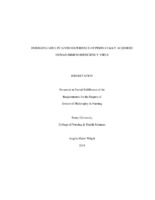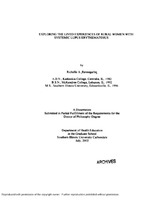Emerging adults' lived experience of perinatally acquired human immunodeficiency virus
View File(s)
- Author(s)
- Details
-
Angela Marie Wright, PhD, APRN, FNP-BC
- Sigma Affiliation
- Lambda Chi
Visitor Statistics
Visits vs Downloads
Visitors - World Map
Top Visiting Countries
| Country | Visits |
|---|
Top Visiting Cities
| City | Visits |
|---|
Visits (last 6 months)
Downloads (last 6 months)
Popular Works for Wright, Angela Marie by View
| Title | Page Views |
|---|
Popular Works for Wright, Angela Marie by Download
| Title | Downloads |
|---|
View Citations
Citations
Background: Human immunodeficiency virus (HIV) and acquired immunodeficiency syndrome (AIDS) is a global problem, infecting over 70 million people worldwide. However, HIV has changed from being a terminal disease to a chronic one, resulting in approximately 10,000 perinatally acquired HIV (PAHIV) adolescents and emerging adults in the United States (U.S.). Little is known about this population because few studies have focused on them. They may encounter physiological, psychological, and sociological challenges that may affect their ability to meet the benchmarks of their developmental stage. Nursing may contribute to improving the health outcomes of individuals living with the disease through nursing education, nursing practice, and nursing research and health and public policy.
Purpose: The purpose of this qualitative heuristic study was to explore the emerging adults’ lived experience of PAHIV. The aim of this study was to determine if the emerging adults were meeting the benchmarks of their developmental stage as their unaffected peers and to elucidate their voices to understand their essence of the experience of PAHIV. This study answered the questions: What is the emerging adults’ lived experience of perinatally acquired HIV (PAHIV)? What benchmarks of the developmental stage are the emerging adults with PAHIV meeting? Philosophical Underpinnings: This study utilized the qualitative research approach with interpretivism and constructivism as the philosophic underpinnings.
Methods: The Heuristic research method of Clarke Moustakas (1990) guided the data collection and data analysis of the study. Convenience and purposive sampling strategies were utilized to select the sample of 15 emerging adults (18-25 years) with PAHIV from v South Florida. Participants who volunteered received care at immunology clinics and private physicians’ offices in South Florida. Data were collected via a researcher-designed questionnaire; face-to-face, semi-structured audiotaped interviews; member check meetings; participants’ reflections; and the researcher’s reflective journal.
Results: The emerging adults’ essences of the experience of PAHIV were the emerged themes of Panorama of Living With HIV; Consciousness and sub-themes Kinship, Concealing, and Paradox; Realities Of Living With HIV, and Affirming Milestones, which were further connected to the principles of the human becoming theory for a philosophical perspective. Participants are extending time in post-secondary education focusing on career building, while developing intimate relationships and delaying childbearing and marriage, similar to their uninfected peers at the same developmental stage of emerging adulthood.
Conclusions: The study revealed that the emerging adults with PAHIV have structured meaning of Panoramic Views of Living With HIV; Consciousness of their HIV status, Kinship with parents and siblings, Concealment of their HIV status from close family members and friend, and medication (ART) Paradox through their images of those experiences that have influenced the values they ascribed to each. Participants have cocreated rhythmicity in Realities of Living With HIV through their relationships with their universe, by being actively involved in the processes of everyday living. Participants are cotranscending Affirming Milestones towards a successful future. They are meeting the benchmarks of the emerging adulthood developmental stage (post-secondary education, career building, delayed marriage, delayed childbearing, and premarital sex) as their HIV uninfected peers.
This dissertation has also been disseminated through the ProQuest Dissertations and Theses database. Dissertation/thesis number: 27543834; ProQuest document ID: 2309942072. The author still retains copyright.
This item has not gone through this repository's peer-review process, but has been accepted by the indicated university or college in partial fulfillment of the requirements for the specified degree.
| Type | Dissertation |
| Acquisition | Proxy-submission |
| Review Type | None: Degree-based Submission |
| Format | Text-based Document |
| Evidence Level | Phenomenology |
| Research Approach | Quantitative Research |
| Keywords | Human Immunodeficiency Virus (HIV); Young Adults with Chronic Illness; Living with HIV |
| Grantor | Barry University |
| Advisor | Chin, Claudette R. |
| Level | PhD |
| Year | 2018 |
All rights reserved by the author(s) and/or publisher(s) listed in this item record unless relinquished in whole or part by a rights notation or a Creative Commons License present in this item record.
All permission requests should be directed accordingly and not to the Sigma Repository.
All submitting authors or publishers have affirmed that when using material in their work where they do not own copyright, they have obtained permission of the copyright holder prior to submission and the rights holder has been acknowledged as necessary.
Related items
Showing items related by title, author, creator and subjects.
-
The emerging adults' lived experience of perinatally acquired human immunodeficiency virus (PAHIV)
Wright, Angela Marie (2017-07-27)Perinatally acquired human immunodeficiency virus (PAHIV) infants are surviving into emerging adulthood and not much is known about this group. This study explores the emerging adult’s lived experience of PAHIV, ... -
Initiation of a HIV screening protocol and pathway in the emergency department: A quality improvement initiative
Davis, Kristina Anne (11/9/2017)There is currently a nationwide campaign to address human immunodeficiency virus (HIV) prevention and treatment. The emergency department (ED) is a significant venue in the HIV prevention and treatment campaign. The quality ... -
Effectiveness of an educational intervention at an academic medical center to reduce stigma of accelerated pre-licensure nursing students toward patients living with HIV
Miller, James StricklandIntroduction: Some health care providers may be reluctant to care for patients with human immunodeficiency virus (HIV) or acquired immunodeficiency syndrome (AIDS). The inclusion of educational opportunities for students ... -
The lived experience of registered nurses caring for patient living with HIV/AIDS in Broward County, Florida: A phenomenological inquiry
Wright, Archimore Alexander (2017-05-19)Vulnerability, opportunistic infections, and infection-related illnesses, caused by the human immunodeficiency virus (HIF), progressively overwhelms the human immune system resulting in acquired immunodeficiency syndrome ... -
Exploring the lived experiences of rural women with systemic lupus erythematosus
Rennegarbe, Richelle A.The purpose of this exploratory study was to describe the lived experiences of rural women with systemic lupus erythematosus (lupus). A qualitative research design was used, employing a convenience sample of 20 women with ...





